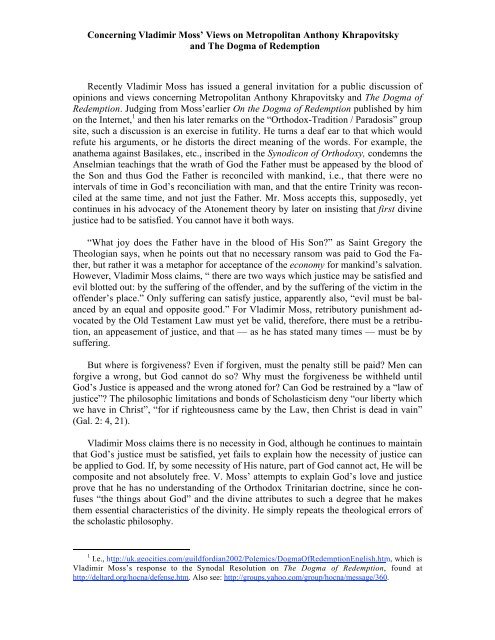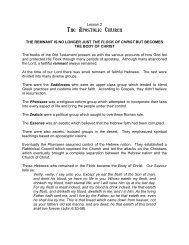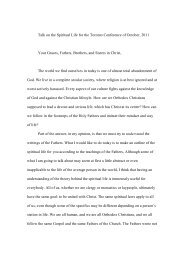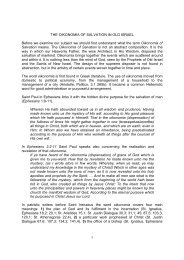Reply to Vladimir Moss Concerning Metropolitan Anthony ...
Reply to Vladimir Moss Concerning Metropolitan Anthony ...
Reply to Vladimir Moss Concerning Metropolitan Anthony ...
Create successful ePaper yourself
Turn your PDF publications into a flip-book with our unique Google optimized e-Paper software.
<strong>Concerning</strong> <strong>Vladimir</strong> <strong>Moss</strong>’ Views on <strong>Metropolitan</strong> <strong>Anthony</strong> Khrapovitsky<br />
and The Dogma of Redemption<br />
Recently <strong>Vladimir</strong> <strong>Moss</strong> has issued a general invitation for a public discussion of<br />
opinions and views concerning <strong>Metropolitan</strong> <strong>Anthony</strong> Khrapovitsky and The Dogma of<br />
Redemption. Judging from <strong>Moss</strong>’earlier On the Dogma of Redemption published by him<br />
on the Internet, 1 and then his later remarks on the “Orthodox-Tradition / Paradosis” group<br />
site, such a discussion is an exercise in futility. He turns a deaf ear <strong>to</strong> that which would<br />
refute his arguments, or he dis<strong>to</strong>rts the direct meaning of the words. For example, the<br />
anathema against Basilakes, etc., inscribed in the Synodicon of Orthodoxy, condemns the<br />
Anselmian teachings that the wrath of God the Father must be appeased by the blood of<br />
the Son and thus God the Father is reconciled with mankind, i.e., that there were no<br />
intervals of time in God’s reconciliation with man, and that the entire Trinity was reconciled<br />
at the same time, and not just the Father. Mr. <strong>Moss</strong> accepts this, supposedly, yet<br />
continues in his advocacy of the A<strong>to</strong>nement theory by later on insisting that first divine<br />
justice had <strong>to</strong> be satisfied. You cannot have it both ways.<br />
“What joy does the Father have in the blood of His Son” as Saint Gregory the<br />
Theologian says, when he points out that no necessary ransom was paid <strong>to</strong> God the Father,<br />
but rather it was a metaphor for acceptance of the economy for mankind’s salvation.<br />
However, <strong>Vladimir</strong> <strong>Moss</strong> claims, “ there are two ways which justice may be satisfied and<br />
evil blotted out: by the suffering of the offender, and by the suffering of the victim in the<br />
offender’s place.” Only suffering can satisfy justice, apparently also, “evil must be balanced<br />
by an equal and opposite good.” For <strong>Vladimir</strong> <strong>Moss</strong>, retribu<strong>to</strong>ry punishment advocated<br />
by the Old Testament Law must yet be valid, therefore, there must be a retribution,<br />
an appeasement of justice, and that — as he has stated many times — must be by<br />
suffering.<br />
But where is forgiveness Even if forgiven, must the penalty still be paid Men can<br />
forgive a wrong, but God cannot do so Why must the forgiveness be withheld until<br />
God’s Justice is appeased and the wrong a<strong>to</strong>ned for Can God be restrained by a “law of<br />
justice” The philosophic limitations and bonds of Scholasticism deny “our liberty which<br />
we have in Christ”, “for if righteousness came by the Law, then Christ is dead in vain”<br />
(Gal. 2: 4, 21).<br />
<strong>Vladimir</strong> <strong>Moss</strong> claims there is no necessity in God, although he continues <strong>to</strong> maintain<br />
that God’s justice must be satisfied, yet fails <strong>to</strong> explain how the necessity of justice can<br />
be applied <strong>to</strong> God. If, by some necessity of His nature, part of God cannot act, He will be<br />
composite and not absolutely free. V. <strong>Moss</strong>’ attempts <strong>to</strong> explain God’s love and justice<br />
prove that he has no understanding of the Orthodox Trinitarian doctrine, since he confuses<br />
“the things about God” and the divine attributes <strong>to</strong> such a degree that he makes<br />
them essential characteristics of the divinity. He simply repeats the theological errors of<br />
the scholastic philosophy.<br />
1 I.e., http://uk.geocities.com/guildfordian2002/Polemics/DogmaOfRedemptionEnglish.htm, which is<br />
<strong>Vladimir</strong> <strong>Moss</strong>’s response <strong>to</strong> the Synodal Resolution on The Dogma of Redemption, found at<br />
http://deltard.org/hocna/defense.htm. Also see: http://groups.yahoo.com/group/hocna/message/360.
<strong>Vladimir</strong> <strong>Moss</strong> declares that he cannot believe that the long line of fathers from <strong>Metropolitan</strong><br />
Peter Mogila, 2 <strong>Metropolitan</strong> Philaret of Moscow, Archbishop Theophan the Recluse,<br />
and Archbishop Theophan of Poltava could ever be in error with their advocacy of<br />
scholastic doctrine. Yet <strong>Vladimir</strong> feels that he can safely ignore the examples from Saints<br />
Irenaeus, Athanasius the Great, Basil the Great, Gregory the Theologian, Gregory of<br />
Nyssa, John Chrysos<strong>to</strong>m, Cyril of Alexandria, Photius the Great and others, as though<br />
they bear no weight, since they refute <strong>Vladimir</strong>’s arguments.<br />
May it be said that Western and Scholastic theologians have long berated and condemned<br />
the Orthodox Church and our Fathers for being primitive, backward, undeveloped,<br />
and lacking in profundity because we have never progressed and developed philosophical<br />
doctrines of a<strong>to</strong>nement, the juridical appeasement of God the Father. 3 Thus<br />
these Western theologians bear witness that such teachings are alien <strong>to</strong> the Church, but<br />
<strong>Vladimir</strong> <strong>Moss</strong> will give intellectual stature <strong>to</strong> the Orthodox by grafting the philosophies<br />
of Scholasticism on<strong>to</strong> our doctrine.<br />
The moral consequences of Scholasticism are demonstrated in the gruesome example<br />
supposedly taken from the life “of one of the greatest of Christian hierarchs, St. Dunstan<br />
of Canterbury († 988)”, which <strong>Vladimir</strong> <strong>Moss</strong> tenders as proof of his contentions. This<br />
account, if genuine, is unique among the his<strong>to</strong>ries of the Saints.<br />
Once three false coiners were caught and sentenced <strong>to</strong> have their hands cut off.<br />
On that day, which was the feast of Pentecost, the Saint was going <strong>to</strong> celebrate<br />
the Divine Liturgy; but he waited, asking whether the sentence had been carried<br />
out. The reply came that the sentence had been deferred <strong>to</strong> another day out of respect<br />
for the feast. “I shall on no account go <strong>to</strong> the altar <strong>to</strong>day,” he said, “until<br />
they have suffered the appointed penalty; for I am concerned in this matter.” For<br />
the criminals were in his power. As he spoke, tears gushed down his cheeks,<br />
showing his love for the condemned men. But when they had been punished, he<br />
washed his face and went up <strong>to</strong> the altar, saying: “Now I am confident that the<br />
Almighty will accept the Sacrifice from my hands.”<br />
Another example from the Scriptures, however, refutes <strong>Vladimir</strong> <strong>Moss</strong>’ understanding<br />
of the necessity for retribution and conditional forgiveness supposedly mandated in<br />
the Old Testament. Pilate released Barabbas <strong>to</strong> the Jews: “Now at that feast the governor<br />
was wont <strong>to</strong> release un<strong>to</strong> the people a prisoner, whom they would” (Matt. 27:15). Here is<br />
a Jewish (and even pagan) understanding of Mercy that acts without Justice first being<br />
satisfied. Surely, Pilate or any governor would not have said: “He is reprieved, pardoned,<br />
and granted clemency — but now we have <strong>to</strong> execute him because Justice demands it.” If<br />
man can forgive and pardon unconditionally, certainly God can. 4<br />
2 Whose Catechism <strong>Vladimir</strong> defends against charges of scholasticism, while admitting in subsequent<br />
postings that he has not read the works of <strong>Metropolitan</strong> Peter Mogila.<br />
3 These Western ‘theologians’ derisively refer <strong>to</strong> our Orthodox doctrine as the “fishhook theory of salvation”,<br />
since many of the Fathers speak of Christ using His Body on the Cross as though it were bait in<br />
order <strong>to</strong> fool, catch, and slay the great leviathan (cf. Job 41:1), that is, the evil one.<br />
4 On the mercy and compassion of God, also see:<br />
The River of Fire http://www.stnectariospress.com/parish/river_of_fire.htm, especially the patristic citations<br />
contained in the footnotes, many of which were incorporated in<strong>to</strong> the Synodal Resolution mentioned<br />
in footnote No. 1 above.<br />
2





